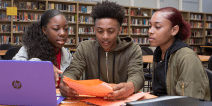
School Redesign
Breadcrumb
Decades of research provide insight into how to design schools to support the whole child. Effective school design not only provides high-quality academic learning but promotes strong interpersonal relationships and authentic and culturally sustaining instruction. The evidence points to core strategies schools can use to rethink structures to promote critical connections and student-centered learning, including the following:
- Smaller schools and learning communities, in which teachers work in teams with shared groups of students organized by grade levels or themes, such as in the Linked Learning model, which integrates college and career preparation.
- Advisory systems, in which a small number of students meet regularly with a teacher—often over multiple years—to address academic and social-emotional issues, build community, and facilitate connections with families
- Grade-to-grade looping, in which a teacher stays with the same class for more than 1 year, developing strong relationships and trust with their students and families
- Collaborative planning and professional development time for teachers who work in grade-level and interdisciplinary teams to create coherent and engaging lessons and projects
- Connections with parents and the broader community through practices such as parent–teacher home visits and community–school partnerships
Center for School and System Redesign
LPI’s Center for School and System Redesign supports research, practice initiatives, and policy strategies that can transform educational systems to respond to the needs of young people for an equitable and empowering education in our rapidly changing world. This work aims to enable practitioners, policymakers, families, and community organizations to understand and use the science on how young people grow and learn to develop schools and systems that facilitate meaningful learning in a caring community.
Further Reading
-
Relationship-Centered Schools
-
Deeper Learning Networks: Taking Student-Centered Learning and Equity to Scale (
report and related materials
) -
Social Justice Humanitas: A Community School Approach to Whole Child Education (
report and brief
) -
Teaching the Way Students Learn Best: Lessons from Bronxdale High School (
report and brief
)
-
Whole Child Structures and Practices
-
Community Schools Impact on Student Outcomes: Evidence From California (
report and related materials
) -
Educating the Whole Child: Improving School Climate to Support Student Success (
report and related materials
) -
Design Principles for Schools: Putting the Science of Learning and Development Into Action (
interactive report
) -
Community Schools as an Effective School Improvement Strategy: A Review of the Evidence (
report and related materials
) -
Community Schools Playbook (
playbook, Partnership for the Future of Learning
) -
Restarting and Reinventing School: Learning in the Time of COVID and Beyond (
interactive report
) -
Using Performance Assessments to Support Student Learning (
report and related materials
)
-








